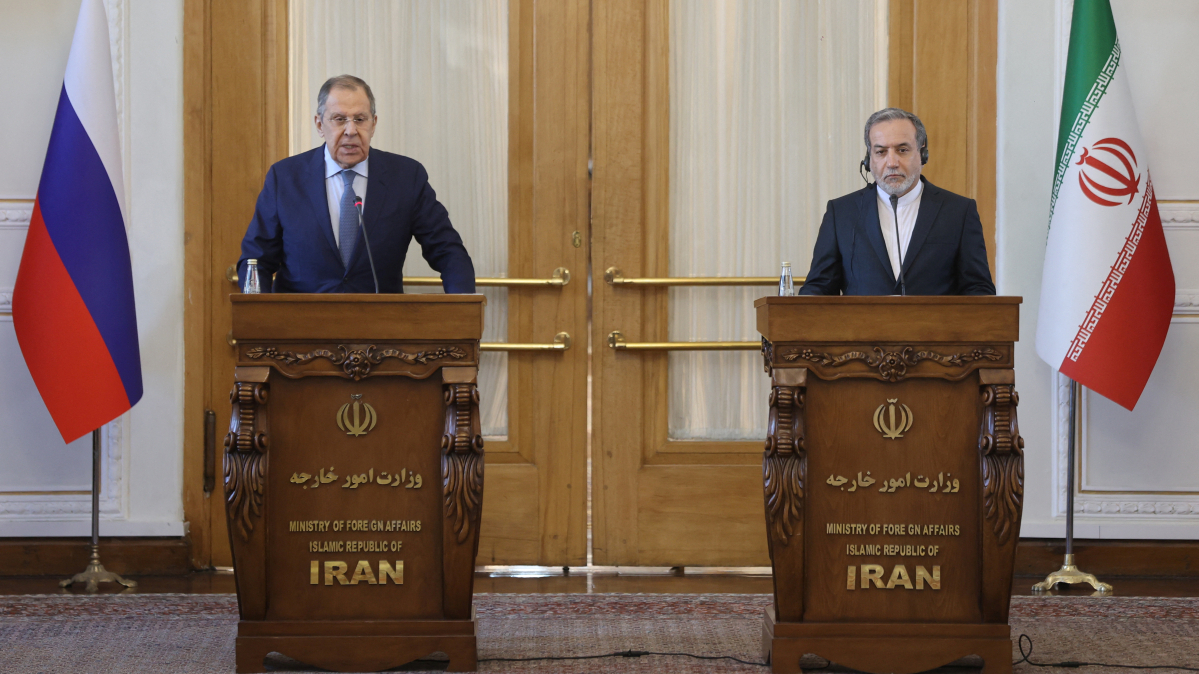Ancient Sinai site reveals 10,000 years of human life, Egypt says
Egyptian archaeologists have uncovered a major prehistoric site in South Sinai dating back around 10,000 years, revealing layers of human activity car...

Iranian Foreign Minister Abbas Araghchi and his Russian counterpart Sergei Lavrov have had a telephone conversation following the recent resolution passed by the International Atomic Energy Agency (IAEA).
The monitoring agency had demanded in a resolution that Tehran’s must inform it “without delay” of the status of its enriched uranium stock and access to “enable the agency do its job”.
The conversation which held via telephone also touched on “bilateral ties, and regional and international developments”.
Tehran said on Friday it had withdrawn from a deal IAEA reached last September in Cairo, Egypt after the agency’s Board of Governors passed a resolution on Thursday.
In a statement released by Russia’s Foreign Ministry, it said, “The conversation focused on regional security,” without giving specific details about what was discussed.
Iran’s Foreign Minister, Abbas Araghchi referred to Tehran’s diplomatic initiatives and consultations with regional countries aimed at strengthening regional peace and stability, and “stressed the importance of continuing this process with the participation of all relevant parties.”
“Lavrov considered the formation of a regional consultation and cooperation framework as an appropriate method for resolving issues between regional countries and announced Moscow's readiness to continue close coordination with Tehran in this regard,” read Iran’s press release.
Foreign Ministry Spokesman Esmaeil Baghaei said Iran withdrew from the Cairo agreement on Friday.
“Iran considers the resolution approved by the Board of Governors of the International Atomic Energy Agency, which was adopted under pressure of the United States, Germany, France and the United Kingdom as illegal and unjustified,” read the statement issued on Friday.
Iran suspended its ties with the IAEA and ceased the nuclear negotiations with the United States mediated by Oman in the wake of airstrikes by Israel and US on its major civilian nuclear sites in June.
Iran’s Foreign Ministry confirmed earlier that IAEA officials inspected some Iranian sites including Tehran Research Reactor last week after receiving the clearance from the Supreme National Security Council which is required by a legislation passed by Parliament.
Iran had laid down the condition that it will consider the new cooperation agreement null and void if UN nuclear sanctions were reimposed, but it did not act after the sanctions were reinstalled in September.
China and Russia who are permanent members of the UN Security Council wielding the veto power, voted against return of UN nuclear sanctions on Iran.
They had tabled a joint draft resolution at the Security Council to postpone return of the sanctions.
Last week, ahead of the IAEA board meeting in Vienna, Austria, Araghchi and Lavrov discussed the planned meet over a telephone call.
They reviewed the situation within the IAEA Board of Governors “where France, the UK and Germany have been seeking to launch an anti-Iranian campaign”, Russia’s Foreign Ministry said.
“They reaffirmed their shared commitment to fully carrying out the Treaty on Comprehensive Strategic Partnership between Russia and Iran,” it added.
Iran and Russia signed the strategic treaty in January 2025 which came into effect on October 2 and is valid for 20 years.
In 2021, Iran and China signed a 25-year cooperation agreement to further develop their existing relations but unlike the Russian treaty, its provisions are not publicised.
James Van Der Beek, who rose to fame as Dawson Leery in the hit teen drama Dawson’s Creek, has died aged 48 following a battle with stage 3 colorectal cancer.
U.S. President Donald Trump and Prime Minister of Israel Trump hosted Netanyahu for closed-door talks focused on negotiations with Tehran, Gaza and wider rBenjamin Netanyahu ended a two-and-a-half-hour meeting at The White House on Wednesday without reaching agreement on how to move forward on Iran.
Norway’s Sturla Holm Laegreid, who won bronze in the men’s biathlon at the Milano Cortina 2026 Winter Olympics on Tuesday (10 February) in Italy, stunned viewers by publicly admitting he had cheated on his girlfriend and pleaded for another chance during post-race interviews.
Türkiye and Greece signalled renewed political will to ease long-standing tensions during high-level talks in Ankara on Wednesday (11 February). Maritime borders, migration and trade topped the agenda as both leaders struck a cautiously optimistic tone.
The suspect in a deadly school shooting in western Canada was an 18-year-old woman who allegedly killed her mother and stepbrother before attacking her former school. Investigators have not provided a motive for what is being described as one of the worst mass killings in Canada.
Türkiye and Serbia agreed to expand cooperation across defence, foreign policy and economic relations following talks between President Recep Tayyip Erdoğan and President Aleksandar Vučić in Ankara.
Plans for sweeping constitutional changes in Kazakhstan have sparked controversy, with civil society representatives accusing the authorities of rushing reforms without sufficient transparency or a clear public mandate.
Azerbaijan’s State Security Service has filed charges against a group of people accused of belonging to a criminal network alleged to have attempted to forcibly seize state power. It's claimed they tried to alter the constitutional structure, with the support of foreign intelligence agencies.
Afghanistan’s Health Minister has urged urgent action to strengthen domestic polio diagnostics and expand healthcare for returnees and vulnerable communities, pressing international partners in Kabul for faster, fully funded support as the country faces mounting strain on its health system.
Iran’s Foreign Minister Abbas Araghchi has firmly ruled out any discussion of the country’s ballistic missile capabilities in the newly resumed, Oman-mediated negotiations with the United States, stating they are not and will never be on the agenda.
You can download the AnewZ application from Play Store and the App Store.

What is your opinion on this topic?
Leave the first comment